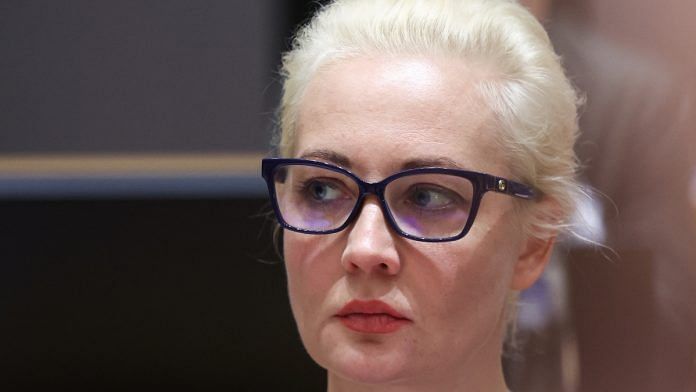New Delhi: Vladimir Putin’s Russia has a new opposition leader. She has risen like a phoenix from the ashes of the Russian President’s old, formidable foe Alexei Navalny.
It took an unbearable tragedy for Yulia Navalnaya to step out of the shadow. But when she finally spoke, her words pierced the hearts of the mourners who were fearfully gathering on Moscow streets with floral tributes to her husband.
On 19 February, Yulia Navalnaya, who had shunned Russian politics for over two decades, looked straight into the camera and declared:
“By killing Alexei, Putin killed half of me – half of my heart and half of my soul…But I still have the other half, and it tells me that I have no right to give up. I will continue the work of Alexei Navalny…continue to fight for our country.”
Yulia Navalnaya’s claim to Alexei Navalny’s legacy as Russia’s critic-in-chief is ThePrint’s Newsmaker of the Week.
Navalny died in a Russian prison in the Arctic Circle, nicknamed “Polar Wolf”, on 16 February after nearly three years of incarceration.
For over twenty years, Navalny was the fulcrum of the Russian opposition, attempting to contest various elections against Putin or his party, whether for the State Duma, the 2013 Moscow mayoral elections, or his 2018 presidential bid.
Though barred from the 2018 election, Navalny remained a thorn in Putin’s side even after the president’s re-election.
Navalny was poisoned in August 2020 after spending days with opposition candidates in Novosibirsk, Siberia’s largest city. He was evacuated to Germany, where then-Chancellor Angela Merkel publicly blamed Russia for the assassination attempt.
The poisoning agent used was Novichok, a soviet-era nerve agent deployed earlier in 2018 against a former spy in Britain. Navalny returned to Russia in January 2021 and was immediately imprisoned; he had remained in Russian prisons since.
Also read: Putin’s neo-Gulags are tools of political terror. Navalny death reveals Russia’s tyrannical past
Munich speech
Navalny’s death broke amid the Munich Security Conference last week. Navalnaya, in attendance, took the stage right after US Vice President Kamala Harris, addressing the gathered leaders:
“We cannot believe Putin or his government. But if this is true [if Alexei is dead], I want Putin and his entourage—his friends, his government—to know they will be held accountable for what they have done to our country, my family, my husband.”
She continued: “And that day will come very soon – and I want to call on the entire world community, everyone in this room and people around the world that we come together to unite and defeat this evil, defeat the horrific regime that is now in Russia.”
Born in Moscow to a middle-class family, the 47-year-old Navalnaya met Alexei in 1998. They married in 2000 and had a daughter, Dasha, in 2001 and son, Zakhar, in 2008.
Dubbed Navalny’s “protector” by The New York Times, she stood firmly by his side through his activism and endless court cases. When he was poisoned in 2020, she demanded his medical evacuation to Germany.
In Munich, upon news of her husband’s death, Navalnaya again publicly spoken out against Putin and his government.
Also read: Sanctions, prolonged war haven’t hurt Russia as much as West hoped, but long-term cost is inevitable
Navalny’s heir?
Navalnaya’s call for unity has led to the US unveiling its largest sanctions package against Moscow to date over Navalny’s suspicious death. She has since met with US President Joe Biden and the foreign ministers of the European Union.
“I encourage you to stand by my side,” she said in her video address. “Do not just share the grief and endless pain…[but] share this anger with me. The anger, rage, and hatred for those who have dared destroy our future.”
However, the question now is—can she effectively organise Russia’s fractured opposition as her husband Navalny once did and mount a viable challenge to Putin in the upcoming election?
Navalnaya resides in Germany. Many other Putin critics, including famed billionaire Mikhail Khardovsky who was jailed by Putin in Siberia for almost a decade, live in exile abroad. Still more critics sit in Russian prisons, as the state’s long reach makes opposition work difficult globally.
Navalny’s body has not been returned to his family a week after his death. His mother alleges Russian authorities are demanding a “secret funeral” in exchange for his body.
For Putin, it was a week of battlefield victory in Ukraine, his biggest political foe’s death in prison, and an assassinated defector in Spain. For his opposition, the grief and chaos are only compounding.
(Edited by Prashant)



